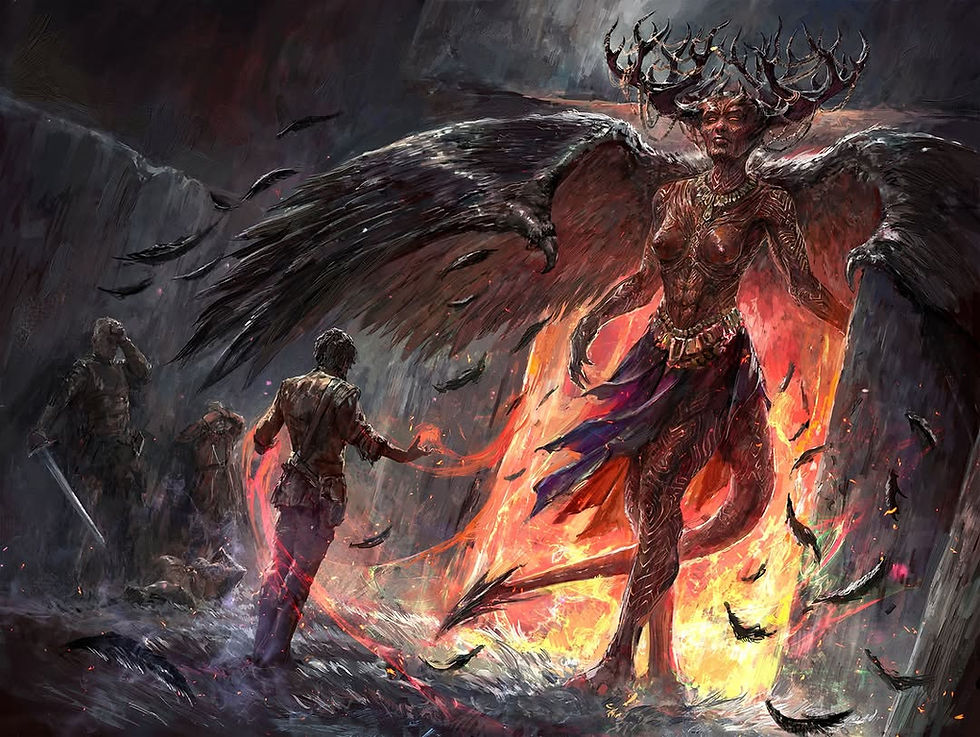Dystopia & Privilege
- zachlaengert
- Apr 24, 2025
- 4 min read
Through the lens of "The Power", "The Handmaid's Tale" and more
The Relative Value of Definitions
Is it more useful to learn a word by its textbook definition or through context? Most of us default to the former, in part because that information is perpetually at our fingertips. Yet – and this is certainly a larger topic for another time – I feel like we've become too reliant on simple statements that close off the need for further discussion and reflection. It's hard to go viral with a complex perspective on any topic, where a pithy remark can spread like wildfire.
A little over a month ago I stumbled on the fascinating observation that: "Dystopian fiction is when you take things that happen in real life to marginalized populations and apply them to people with privilege" (I saw it elsewhere, but I'm quoting from a Reddit post). I agree with the observation – that's what my post today is about – but I also think it's unhelpfully reductive as a definition of dystopian fiction as a whole.
We're so quick to assign statements like this one of two values: it's absolutely true, or it's completely worthless – just read through that Reddit thread and see every person take one stance or the other.
So today I'd like to look at two contexts where this observation is useful, explore how and why it's important and generally remind us all to think beyond the binary.

Reversal & Removal of Privilege
Speaking of definitions, here are some for (social) privilege and dystopian fiction. Just as dystopian fiction is more complex than the above Redditor's definition, social privilege is far from black and white, have or have not; intersectionality helps to understand how everyone has many different aspects in which they may or may not be privileged.
Anyway. My book club read Naomi Alderman's The Power for April and we're meeting to discuss it tonight, so believe me when I saw this book is fresh on my mind. The novel sees teenage girls and women suddenly manifest the power to channel electricity, capable of causing varying levels of injury up to and including death (with enough skill, even making the murder look indistinguishable from a heart attack).
The central concern of the book is the reversal of privilege based on sex, men's physical advantages now overruled by women's electricity. To a lesser extent, it also impacts the privilege of age – teenage girls have greatest control over the Power – and introduces a new form of privilege: some girls have it stronger than others.
Attempting to apply the above definition, we would call this a dystopia because privileged people – in this case men – are now experiencing the real-world conditions of marginalized people – in this case women. And um, yes, that's exactly what Alderman is doing here. Men are objectified, harassed, sexually assaulted, stripped of their legal rights and casually murdered at various points in the book. The frame narrative reverses broader, societal sexism.

It's a fascinating idea, even if I found the execution a little mixed. Most men in this book are deeply unlikeable and are exactly the type who are complaining about being oppressed in our own world, making it difficult to get a sense of their actual experiences until a few brutal scenes towards the ending. Even then it feels overshadowed by the rapid escalation to total war, which doesn't feel at all related to Alderman's thesis.
But in a few scenes you do get a real sense of the privilege being reversed, and those are a powerful reminder of the everyday sexism that women in our world deal with. That's the reason dystopian fiction does this, right? To demonstrate real world conditions by making them just a little bit closer to home for the reader.
On that note, The Handmaid's Tale. Terrifying, gobsmacking, unreal in its portrayal of an extremist religious and patriarchal society.
Except not that unreal: author Margaret Atwood was inspired by the recent history of Afghanistan (where women had many rights prior to a sudden reversal with the rise of the Taliban in the 90's) and transposed that situation onto modern America. Moving the situation closer to home, making it affect people with privilege (in this case those of being Western and often white) heightens the feeling of dystopia in a way that, sadly, real history didn't for many viewers.
So while these works can be eye-opening, they can't be the start and end of our understanding – ideally, works like The Handmaid's Tale could point to the real world situation instead of overwriting it. Every viewer who says "at least that could never happen here" badly needs that wake up call before it's too late; just look at the States right now.

Art Imitates Life
Even moving beyond these concrete examples – and even beyond dystopian stories – the idea at the core of this definition is one that my whole blog is based on: the stories we tell reflect aspects ourselves and our society. A lot of YA dystopian fiction invents novel, exciting situations to impart morals highly relevant to the real world and growing up in it.
Others exaggerate real-world marginalization to achieve a similar goal of highlighting real issues, whether social, economic, environmental etc. – and more often than not a combination.
By reading these stories, empathizing with their characters and finding the real humanity in them, hopefully we can begin to recognize the shape of these situations in our own lives and try to ward them off before it's too late.
Thanks for reading and until next time <3







Comments